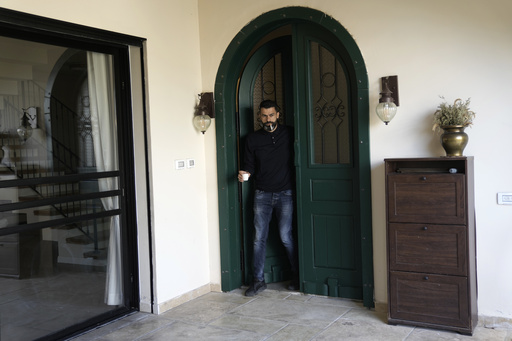
UMM AL-FAHM, Israel — A crackdown by Israeli authorities against Palestinian citizens voicing dissent regarding the ongoing war in Gaza has led many individuals to reconsider their willingness to speak out due to fears of arrest and social ostracism. Despite this, a number of activists are still attempting to express their views — though with great caution.
Ahmed Khalefa experienced a dramatic shift in his life after being accused of inciting terrorism due to his participation in an anti-war demonstration where he expressed solidarity with Gaza in October 2023. The city council member and lawyer from central Israel reported enduring a challenging three months in jail, followed by another six months under house arrest, restricted from leaving his home from nightfall to dawn. The timeline for his trial remains uncertain, leaving him in legal limbo.
According to Adalah, a legal organization advocating for minority rights, over 400 Palestinian citizens of Israel have been subjected to police scrutiny for alleged “incitement to terrorism” or “incitement to violence” since the war began. More than half of those investigated have faced criminal charges or detention, hinting at a concerning trend aimed at suppressing dissent.
Khalefa articulated the sentiment prevalent among many, stating, “Israel has made it evident that they view us more as adversaries than as citizens.” His comments were made during an interview at a café in Umm al-Fahm, Israel’s second-largest city with a significant Palestinian population.
Approximately 2 million Palestinian citizens reside in Israel, with ancestral ties tracing back to 1948 when the state was established. This community encompasses both Muslims and Christians, maintaining connections with family members in Gaza and the West Bank, regions that Israel occupied in 1967.
While the Israeli government professes that Palestinian citizens have equal rights, including voting rights and representation across various sectors, they frequently face discrimination particularly in housing and job opportunities.
Recent records from Adalah indicate that the number of incitement cases pursued against Palestinian citizens during the Gaza conflict exceeds the total from the previous five years combined. The Justice Ministry has not disclosed how many of these cases have resulted in convictions or incarcerations. A law enacted in 2016 allows for the detention of individuals charged with incitement, further tightening the grip on freedom of expression.
Activists report that many Palestinian citizens are experiencing job losses, suspensions from academic institutions, and police questioning for expressing their opinions online or participating in protests. Oumaya Jabareen, whose son faced an eight-month jail term following an anti-war demonstration, commented on the pervasive climate of fear, saying, “Anyone who attempts to voice concerns about the war will face imprisonment and suffer repercussions in their careers and education.”
Earlier this month, Jabareen was among countless demonstrators in Umm al-Fahm who marched with banners and political slogans. This gathering appeared to be the largest anti-war protest in the country since the Hamas assault on October 7. However, turnout was disappointingly low, and symbols such as Palestinian flags were noticeably absent, contrasting with the pre-war protests that sometimes attracted tens of thousands.
The police maintained a heavily armed presence at the recent march, monitoring the participants from above with helicopters while foot patrols with rifles and tear gas accompanied the procession. Participants dispersed peacefully after two hours, although Khalefa opted not to take part.
Following the initial attack, Israel’s far-right government took swift action to reinforce a task force aimed at prosecuting Palestinian citizens for “supporting terrorism” based on social media posts or protests opposing the war. Concurrently, legislative amendments increased oversight of online activities among Palestinians in Israel, creating an environment of heightened control according to Nadim Nashif, who heads a digital rights group. He noted that these policies have intensified the crackdown on free expression and arrest operations.
Itamar Ben-Gvir, the national security minister leading this task force, stated that thousands of posts allegedly supporting terrorist organizations have been monitored, resulting in the arrest of “hundreds of terror supporters,” including prominent public figures and social media influencers. His office emphasized that “freedom of speech does not extend to incitement that poses a threat to public safety.”
However, rights advocates assert that the Israeli government has broadened its interpretation of incitement significantly, targeting legitimate expressions of opinion that lie at the heart of free speech. Myssana Morany, an attorney with Adalah, cited multiple cases where individuals faced charges for seemingly harmless expressions, such as sharing humorous content related to captured military vehicles or posting a collage of children’s images highlighting the plight of innocent victims in conflict.
In the summer, police actions against anti-war protesters in Haifa exemplified this suppression, as they were forced to disband shortly after beginning their chants. In contrast, protests by Jewish Israelis advocating for hostage releases have seen considerably larger turnouts, sometimes numbering in the hundreds of thousands.
Khalefa remains skeptical about the potential for the government crackdown on free speech to diminish, even with the war’s conclusion. He cited attempts by prosecutors to penalize him for expressing broad resistance sentiments that did not explicitly call for violence. Facing the prospect of up to eight years in prison, he reflects on the broader implications of these actions, noting, “They want to show us the consequences of speaking out.”
